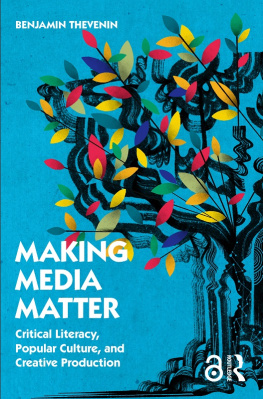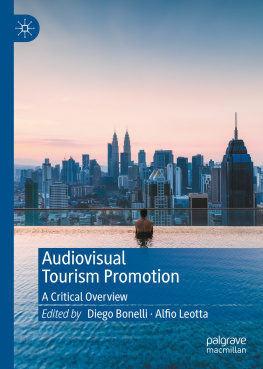critical terms for media studies
CRITICAL TERMS FOR MEDIA STUDIES
Edited by w.j.t. mitchell and mark b.n. hansen
the university of chicago press Chicago and London
The University of Chicago Press, Chicago 60637
The University of Chicago Press, Ltd., London
2010 by The University of Chicago
All rights reserved. Published 2010
Printed in the United States of America
18 17 16 15 14 13 12 11 10
1 2 3 4 5
isbn -13: 978-0-226-53254-7 (cloth)
isbn -10: 0-226-53254-2 (cloth)
isbn -13: 978-0-226-53255-4 (paper)
isbn -10: 0-226-53255-0 (paper)
Library of Congress Cataloging-in-Publication Data
Critical terms for media studies / edited by W. J. T. Mitchell and Mark Hansen.
p. cm.
Includes index.
isbn -13: 978-0-226-53254-7 (cloth : alk. paper)
isbn -10: 0-226-53254-2 (cloth : alk. paper)
isbn -13: 978-0-226-53255-4 (pbk. : alk. paper)
isbn -10: 0-226-53255-0 (pbk. : alk. paper)
1. Literature and technology. 2. Art and technology. 3. Technology
Philosophy. 4. Digital media. 5. Mass media. 6. Image (Philosophy).
I. Mitchell, W. J. T. (William John Thomas), 1942 II. Hansen,
Mark B. N. (Mark Boris Nicola), 1965
pn 56. t 37c75 2010
302.23dc22
2009030841
The paper used in this publication meets the minimum requirements of the American National Standard for Information SciencesPermanence of Paper for Printed Library Materials, ansi z39.48-1992.
Introduction
w.j.t. mitchell and mark b.n. hansen
"Media determine our situation." With these lines, German media scientist Friedrich Kittler begins his influential historical theorization of media, Gramophone, Film, Typewriter. Packed into Kittlers statement is a crucial claim: that media form the infrastructural basis, the quasi-transcendental condition, for experience and understanding. Like the strata of the seeable and sayable that, in French philosopher Michel Foucaults archaeology of knowledge, make knowledge possible in a given historical moment, media broker the giving of space and time within which concrete experience becomes possible.
This broad claim forms the motivating insight behind this volume of essays devoted to critical terms for the study of media. In todays intellectual climate, it would be no exaggeration to cite media as a central topic of research in the humanities and the humanistic social sciences, and for precisely the reason indicated by Kittler. Media can no longer be dismissed as neutral or transparent, subordinate or merely supplemental to the information they convey. Rather, an explosion of work by a diverse group of scholars representing a host of fields, disciplines, and interdisciplines has attested to their social and cultural agency. Not surprisingly, in the wake of this work, media studies has emerged as a viable research area, under rubrics like Comparative Media Studies (at MIT) and Literature, Communication, and Culture (at Georgia Tech), and as the focus of an ever-expanding range of research initiatives across the globe.
Despite this process of institutional consolidation, however, media studies remains an amorphous enterprise, more of a loosely associated set of approaches than a unified field. One can find practitioners who apply statistical methods to analyze audience response to media content and others who focus on the political impact of media consolidation and deregulation. Media studies embraces researchers who study virtual reality environments, hypertext fiction, materialist anthropology and culture, the history of information theory, precinematic devices, the insti tution of print, and word frequency in Greek literature. Indeed, the circle could be expanded to embrace any practice involving material artifacts, which is to say, the vast majority of practices in the humanities and humanistic social sciences. We are, it seems, all practitioners of media studies, whether we recognize it or not.
The question, then, becomes how we delimit media studies and, perhaps more profoundly, what is to be gained by such delimitation. Turning to Wikipedia (why not, given the key role played by new computational technologies in making the inescapability of media, well, inescapable), we find one strategy for dealing with the amorphous state of media studies: minimal definition. Media Studies, the entry begins, is the study of the constitution, history, and effects of media. It goes on to divide media studies (usefully, to be sure) into two traditions: on the one hand, the tradition of empirical sciences like communication studies, sociology and economics, which generally focus on Mass Media, their political, social, economic and cultural role and impact in creating and distributing content to media audiences; on the other hand, the tradition of humanities like literary theory, film/video studies, cultural studies and philosophy, which focus on the constitution of media and question... [how] they shape what is regarded as knowledge and as communicable. Media studies thus comprises any study of media, within any discipline or interdiscipline, and may be subdivided according to the conventions governing research in those fields. These conventions group into two categoriesthe empirical and the interpretivewhich, though far from homogeneous, designate two broad methodological approaches to media as the content of research.
We do not discount the value of such taxonomies. But we and the authors represented in this volume take a somewhat different tack. Rather than focusing on media as the content of this or that research program, we foreground a range of broader theoretical questions: What is a medium? How does the concept of medium relate to the media? What role does mediation play in the operation of a medium, or of media more generally? How are media distributed across the nexus of technology, aesthetics, and society, and can they serve as points of convergence that facilitate communication among these domains? Expressed schematically, our approach calls on us to exploit the ambiguity of the concept of mediathe slippage from plural to singular, from differentiated forms to overarching technical platforms and theoretical vantage pointsas a third term capable of bridging, or mediating, the binaries (empirical versus interpretive, form versus content, etc.) that have structured media studies until now. In a minimal sense, what the emergence of the collective singular media betokens is the operation of a deep, technoanthro pological universal that has structured the history of humanity from its very origin (the tool-using and inventing primate). In addition to naming individual mediums at concrete points within that history, media, in our view, also names a technical form or formal technics, indeed a general mediality that is constitutive of the human as a biotechnical form of life. Media, then, functions as a critical concept in something like the way that the Freudian unconscious, Marxian modes of production, and Derridas concept of writing have done in their respective domains. Though a distinct innovation, this general concept of mediality that we are proposing reveals thinkers from Aristotle to Walter Benjamin to have been media theorists all along. Sophocles had no concept of the Oedipus complex, but after Freud it becomes difficult to think about Greek tragedy without reference to psychoanalytic categories. Shakespeare had no concept of media, but his plays may be profitably studied as specific syntheses of varied technical, architectural, and literary practices. The very concept of media is thus both a new invention and a tool for excavating the deepest archaeological layers of human forms of life. It is our collective attentiveness to this deep, technoanthropological universal sense of media that allows us to range across divides (characteristically triangulated) that are normally left unbroached in media studies: society-technology-aesthetics, empirical-formal-constitutive, social-historical-experiential.
Next page





